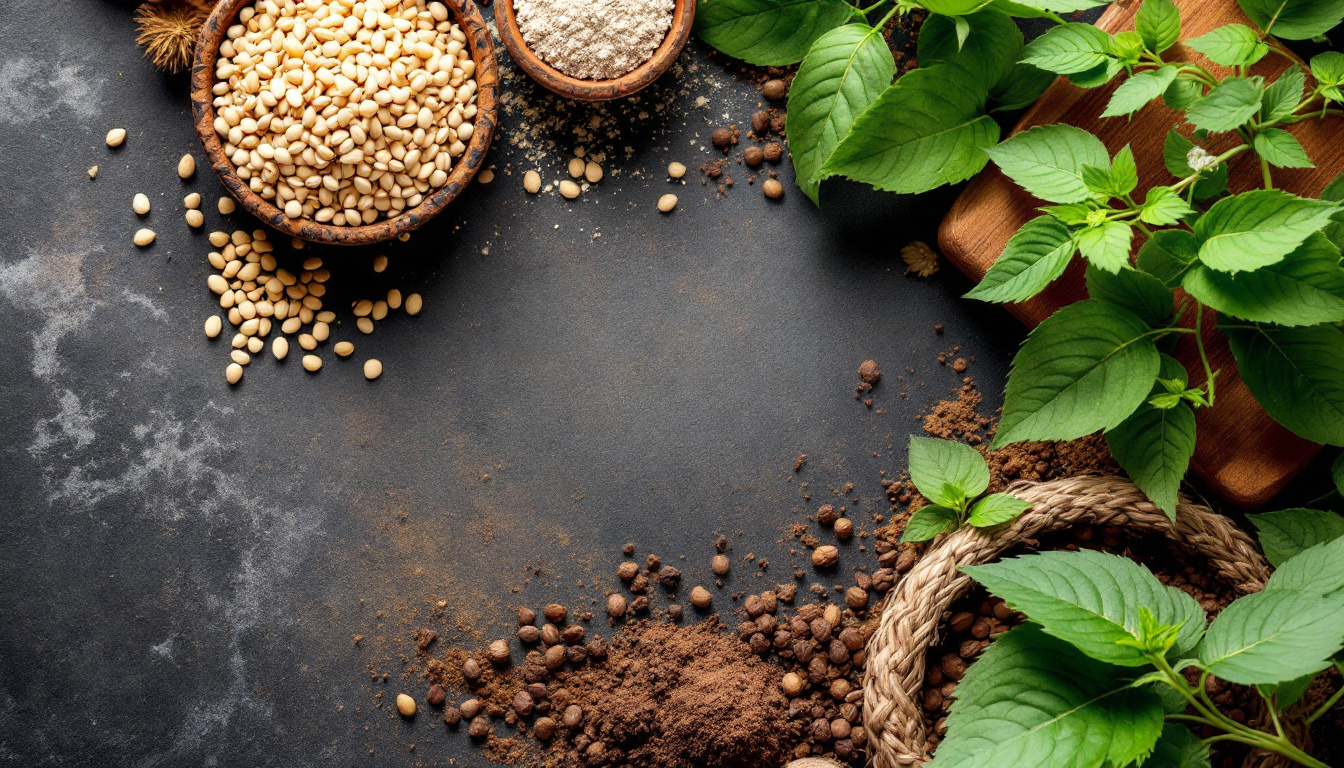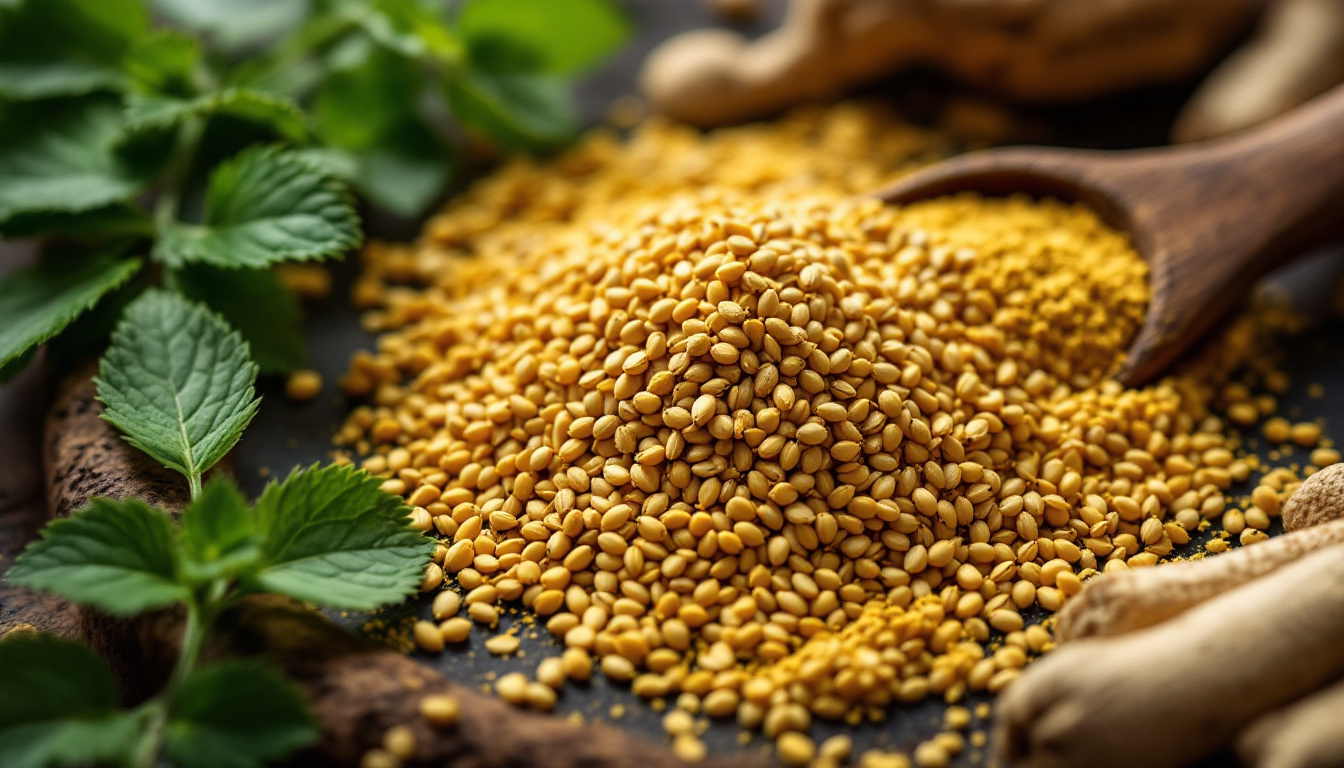Fenugreek, Maca & Tribulus: Nature’s Testosterone-Supporting Trio
In the realm of natural supplements, few combinations have garnered as much attention as fenugreek, maca, and tribulus. These three herbs are not just popular; they are celebrated for their potential to support testosterone levels and enhance overall male vitality. As the market for testosterone boosters continues to grow, understanding the benefits and mechanisms of these herbs becomes increasingly important.
The Rise of Natural Testosterone Boosters
With a significant number of men seeking ways to enhance their testosterone levels, the demand for natural supplements has surged. Recent studies indicate that nearly half of testosterone booster supplements contain fenugreek extract, while maca and tribulus also feature prominently in many formulations. This trend reflects a growing interest in harnessing the power of nature to support hormonal health.

Understanding Testosterone and Its Importance
Testosterone is a crucial hormone that plays a vital role in various bodily functions, including muscle growth, fat distribution, and libido. As men age, testosterone levels naturally decline, which can lead to a range of health issues. This decline has prompted many to explore natural alternatives to maintain their testosterone levels.
The Role of Supplements in Hormonal Health
Natural supplements like fenugreek, maca, and tribulus are often viewed as safer alternatives to synthetic testosterone therapies. They may help support testosterone production and improve overall well-being without the side effects associated with pharmaceutical options.
Fenugreek: A Powerhouse for Testosterone Support
Fenugreek, a herb commonly used in cooking, has gained recognition for its potential health benefits, particularly in relation to testosterone levels. Research indicates that fenugreek possesses anabolic and androgenic properties, which may aid in muscle growth and enhance libido.

Scientific Insights into Fenugreek
A systematic review of studies on fenugreek seed extracts revealed that four out of six studies demonstrated significant increases in testosterone concentrations among men. This evidence suggests that fenugreek could be a valuable addition to testosterone-boosting regimens.
Moreover, a recent double-blind, randomized clinical trial found that fenugreek supplementation improved leg strength, aerobic capacity, and body composition in aging men. These findings underscore the herb's potential to support not just testosterone levels but also overall physical performance.
Market Growth and Popularity
The popularity of fenugreek is reflected in its market growth. In 2017, U.S. sales of fenugreek supplements increased by 33.5%, reaching an impressive $28.8 million. This surge indicates a growing consumer awareness of the herb's benefits and its role in testosterone support.
Maca: The Andean Wonder
Maca, a root vegetable native to the Andes mountains, has been used for centuries for its health benefits. Known for its ability to enhance libido and stimulate testosterone production, maca is another key player in the testosterone-supporting trio.
Benefits of Maca for Men
Research has shown that maca can improve sexual functioning and mood in both men and women. A study published in the Journal of Exercise and Nutrition found that maca supplementation led to improvements in grip strength and overall well-being. These effects may be attributed to maca's active compounds, which stimulate androgen receptors in the body.
Market Presence and Consumer Interest
Despite being less prevalent than fenugreek, maca is still found in 22.2% of testosterone booster supplements. Its unique properties and historical use have contributed to its growing popularity, making it a sought-after ingredient in the health and wellness industry.
Tribulus: The Traditional Testosterone Enhancer
Tribulus terrestris, often simply referred to as tribulus, has a long history of use in traditional medicine for enhancing libido and testosterone production. This herb is rich in saponins, which are believed to stimulate androgen receptors and promote hormonal balance.
Research Findings on Tribulus
Studies have shown that tribulus supplementation can lead to significant increases in testosterone levels in men. One notable study published in Phytomedicine highlighted the herb's effectiveness in boosting testosterone, further solidifying its reputation as a natural testosterone enhancer.
Market Trends and Growth
The market for tribulus supplements has also seen substantial growth, with U.S. sales increasing by 42.2% in 2017, reaching $19.5 million. This growth reflects a rising consumer interest in natural solutions for testosterone support and overall male health.
Combining the Trio for Optimal Results
While each of these herbs offers unique benefits, combining fenugreek, maca, and tribulus may provide a synergistic effect, enhancing their individual properties. This trio could potentially support testosterone levels, improve physical performance, and boost libido, making it an appealing option for those looking to enhance their vitality.
Practical Tips for Incorporation
For those interested in incorporating these herbs into their routine, it is essential to choose high-quality supplements from reputable sources. Consulting with a healthcare professional before starting any new supplement regimen is also advisable to ensure safety and efficacy.
Conclusion: Nature’s Answer to Testosterone Support
As the interest in natural testosterone boosters continues to grow, fenugreek, maca, and tribulus stand out as powerful allies in supporting hormonal health. With a wealth of research backing their benefits, these herbs offer a promising approach for men seeking to enhance their testosterone levels and overall well-being.
In summary, the combination of fenugreek, maca, and tribulus not only reflects a growing trend in the health and wellness industry but also highlights the potential of nature to support our health in meaningful ways. As always, informed choices and a holistic approach to health are key to achieving the best results.
